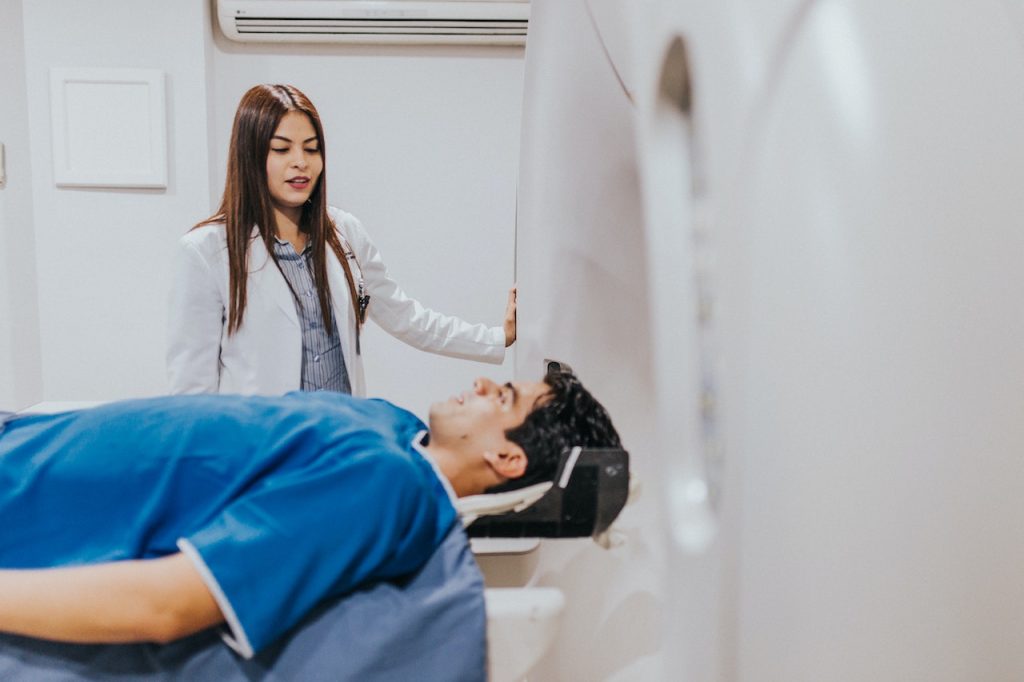
Prostate cancer that may otherwise be missed could be picked up by MRI scans, according to a new study.
Oncologists at University College London claim making MRI a first port of call for screening, without men having to ask for it, could reduce the chance of dying from prostate cancer, as well as over-treatment.
Men with symptoms of cancer usually need a “high” prostate-specific antigen (PSA) score of over 3ng/ml to get extra tests, including a biopsy.
High quantities of the protein can indicate cancer.
MRI scans revealed that 50 percent of the men with serious prostate cancer had less than 3ng/ml PSA – this half would not have received extra tests under the current system, and their cases may have been missed.
Using the tech, the team found that 16 percent of UCL’s participants had undetected prostate cancer with a median PSA density of just 1.2ng/ml.

Around two-thirds of these men would not have met the 3ng/ml threshold for a referral, and they would not have been investigated any further under the current system.
After the NHS assessment 29 men, or 9.6 percent of the cohort, were diagnosed with cancer that required treatment and three were found to have low-risk cancer that needed no further action.
A total of 48 out of the 303 50-75-year-olds selected tested positive for some form of prostate cancer.
“The thought that half the men with clinically significant cancer had a PSA less than 3 ng/ml and would have been reassured that they didn’t have cancer by a PSA test alone is a sobering one and reiterates the need to consider a new approach to prostate cancer screening,” said Professor Caroline Moore, consultant surgeon at UCLH and chief investigator of the study.
“Our results give an early indication that MRI could offer a more reliable method of detecting potentially serious cancers early, with the added benefit that less than one percent of participants were ‘over-diagnosed’ with low-risk disease.
“More studies in larger groups are needed to assess this further,” said the Professor.
Until now, the standard testing protocol has been a PSA test and a digital rectal exam, followed by a biopsy if there is suspected cancer.
The method has made patients 20 percent less likely to die from the disease after 16 years.
However, it has also been linked to over-diagnosis, excessive treatment for lower-risk cancers, and can potentially involve an invasive biopsy that can lead to complications, which may be unnecessary.
Already, MRI scans on men with a higher risk of prostate cancer have spared one in four from an unnecessary biopsy.

Recruitment for the trial indicated black men responded at one-fifth of the rate of white men, and the authors say this must be addressed in future research.
The UCL study is a part of REIMAGINE, a consortium seeking to change the way prostate cancer is diagnosed.
“One in four black men will get prostate cancer during their lifetime, which is double the number of men from other ethnicities,” said Saran Green, an author of the study from King’s College London
“Given this elevated risk and the fact that black men were five times less likely to sign up for the REIMAGINE trial than white men, it will be crucial that any national screening program includes strategies to reach black men and encourage more of them to come forward for testing.”
The trial published in BMJ Oncology is being expanded to include a larger number of participants and will attempt to recruit more black men.
Methods may include mobile “scan in a van” initiatives, designed to visit communities less likely to come forward for testing via a GP invitation.
Senior study author Professor Mark Emberton, UCL Cancer Institute and consultant urologist at UCLH, said: “The UK prostate cancer mortality rate is twice as high as in countries like the US or Spain because our levels of testing are much lower than other countries.
“Given how treatable prostate cancer is when caught early, I’m confident that a national screening program will reduce the UK’s prostate cancer mortality rate significantly.
“There is a lot of work to be done to get us to that point, but I believe this will be possible within the next five to ten years.”
Produced in association with SWNS Talker
Edited by Judy J. Rotich and Newsdesk Manager







